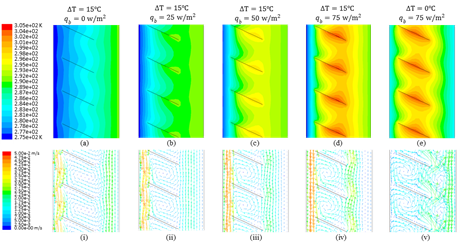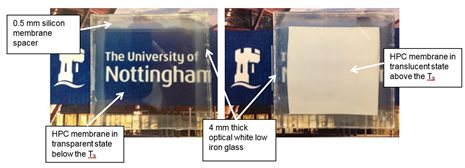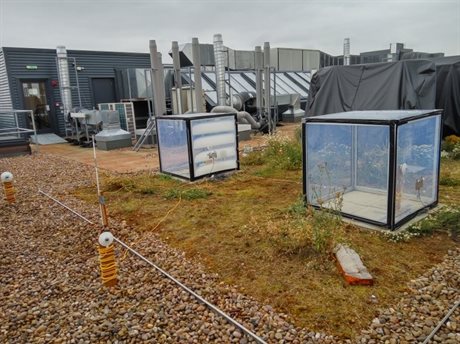Smart Materials and Energy Efficient Buildings
Smart Materials focuses on design and development of novel dynamic smart building window/façades. The novel façade can dynamically control:
- solar light
- heat
- generate electricity
Therefore reducing building energy consumption and maintaining comfortable and healthy conditions within buildings.
These advances are necessary if the building sector is to play its part in supporting wider government strategies for meeting national and international targets for reductions in carbon emissions. We have a large climatic chamber which can be used to study the thermal characterisations of façade.
Current Projects
Tensile Membrane Structure Design and Integration with PV
Funder: Innovate UK
Total value: £175,000
Principle Investigator:
Co-Investigators:
Summary:
This project aims to plan, develop and implement novel tensile membrane structures and also adaptable textile-covered building facades integrating tensile photovoltaic membranes for energy harvesting and environmental control
Transparent Insulation Material for Building Energy Saving and Daylight Comfort
Summary:
This research will explore and develop a novel low cost and transparent solar facade to reduce energy consumption in buildings. An optical and thermal model will be used to aid the system design. The performance and stability of the developed system will be investigated in a controlled indoor environment and also outdoor environment.
Associated Publications:
Sun, Y., Wu, Y. and Wilson, R., 2017, Analysis of the daylight performance of a glazing system with Parallel Slat Transparent Insulation Material (PS-TIM), Energy and Building, 139, 616-633
Sun. Y., Wu. Y., Wilson R. and Sun. S., 2016, Thermal and optical analysis of a novel glazing façade system with parallel slats Transparent Insulation Material (PS-TIM), Building and Environment, 105, 69-81
Sun. Y., Wu. Y., Wilson R. and Lu S., 2016, Experimental and numerical study of the thermal properties of a glazing system with an interstitial Venetian blind, Building and Environment, 103, 111-122

Development of an adaptive facade element for daylight and thermal control
Summary:
This study focused on analysis of thermal and visual performance in office building with VO2-based thermochromic smart windows applied. This research aims to provide a comprehensive guidance for improving thermal and optical properties of thermochromic smart windows that benefit indoor environment efficiently. Research is mainly consist of two parts: 1) energyplus will be utilised to simulate smart window in a typical office room under various climatic conditions to investigate its influence on window heat gain/heat loss, energy consumption, useful daylighting illuminance (UDI) and so on; 2) experiment was designed to explore the human response to thermochomic windows, including reading acuity, contrast and other sensations, aiming to test the acceptance of thermochromic smart windows applied in practical.
Associated Publications:
Liang R., Wu. Y. and Wilson R., 2015, Thermal and visual analysis of an office with thermochromic smart windows applied, CISBAT 2015 International Conference Future Building & Districts Sustainability From Nano to Urban Scale
Past Projects
Embedded systems for integrated Photovoltaics in Rural Buildings: E-IPB
Funder: Innovate UK
Total value: £950,937
Principle Investigator:
Co-Investigators:
Smart solar concentrator for building integrated photovoltaic facades
Funder: Faculty of Engineering
Total value: £35,000
Principle Investigator:
Summary:
This research will explore and develop a novel lightweight static concentrating Photovoltaics (PV) system with optimised performance suitable for use in windows or glazed façades in buildings. The proposed system is low cost and high efficiency, has the ability to generate electricity and hot water simultaneously, and can be effectively integrated into an existing building envelope component. This novel system will also respond automatically to climate, varying the balance of electricity generated from the PV and the transmission of daylight and shortwave radiation into the building. It therefore offers the potential to minimise and control net energy use in buildings.
Associated Publications:
Wu, Y., Connelly, K., Liu, Y., Gu, X., Gao, Y., and Chen, G. Z., 2016, Smart solar concentrators for building integrated photovoltaic façades, Solar Energy, 133, 111-118
Connelly, K., Wu, Y., Chen, J., Lei, Y., 2016, Design and Development of a Reflective Membrane for a Novel Building Integrated Concentrating Photovoltaic (BICPV) 'Smart Window' System, Applied Energy, 182, 331-339

Image: A HPC membrane in transparent state below the Ts.
Development of a passive heat recovery and storage system for greenhouse façade/roof
Funder: Innovate UK
Total value: £59,888
Principle Investigator:
Co-Investigators:
Summary:
This project aims to design, develop and implement a passive heat recovery and storage system for the ETFE foil encapsulated greenhouse façade/roof using phase change material. It will provide good daytime light transmittance, store unwanted heat and maintain a more comfortable condition within the greenhouse. Heat stored during the day will subsequently be used during the night for passive heating.
Associated Publications:
Xiao Liu, Hao Gao, Yanyi Sun, Yupeng Wu, Benjamin Martin, John Chilton, Parham Mirzaei, Paolo Beccarelli, Benson Lau, 2016, Thermal and optical analysis of a passive heat recovery and storage system for greenhouse skin, Procedia Engineering, 155, 472-478
